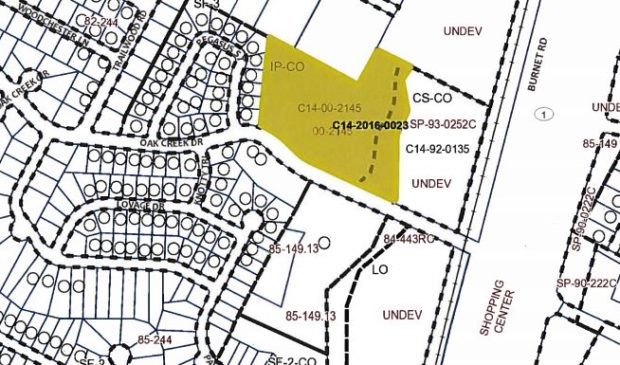Elysium Park gets initial Council approval, despite neighborhood opposition
Monday, February 6, 2017 by
Cate Malek For those wondering why building affordable housing in Austin is going so slowly, the Elysium Park development has been a case study of many of the tensions City Council is facing in its attempts to keep low-income people from fleeing the city.
On Thursday, Council unanimously approved a rezoning for the hard-fought development on first reading, despite serious opposition from neighborhood associations and a lack of support at the state level. The developer is seeking a zoning change from Industrial Park and Rural Residential to Multifamily zoning, with development limited to 90 units on the 7.1-acre tract.
Over 1,100 residents of the North Austin neighborhoods surrounding Elysium Park signed a petition protesting the development. Critics of the development, which is located at 3300 Oak Creek Drive west of MoPac Expressway and north of Parmer Lane, said the area suffers from poor access to public transportation as well as dangerous roads, flooding and a faulty wastewater system.
But although Council members acknowledged the difficulties, they argued that there are no better options for affordable housing in Austin.
“This is a hard city,” said Mayor Steve Adler. “We have these cases because there’s virtually no part of this city that has mobility and traffic and transportation that works.”
The proposed development would bring 80 to 90 apartment homes into the area. Although the buildings would be mixed-income, over half of the apartments would be for low-income families making between 30 and 50 percent of the median income for the city. Council has named this income range as the most vulnerable in Austin, as there is virtually no housing at this price range in the city.
The project originally came before Council last August but was delayed indefinitely after state funding unexpectedly dried up. But, by shifting some of the apartment units to a lower price threshold, the developer was able to overcome that hurdle and qualify the project for possible state tax credits.
“I know that this property will be developed, and if it isn’t developed now, it will be at some point,” said Council Member Leslie Pool. “And when it’s developed, I don’t want it to be an industrial park project or a massive complex of efficiencies.”
Pool said she believes the strength of the project is that it’s mixed-income and “can support families, and that complements the community.” But many members of the neighborhood disagreed that the new apartments would benefit their community.
“We hope that Council members will champion the idea of working with developers to target better locations for housing than the proposed site,” said resident Ed English, who spoke at Thursday’s meeting. Neighborhood residents painted the picture of an area that was already stretched to the brink in terms of development, mobility and transportation challenges. But several speakers pointed out that families looking for affordable housing are less concerned with finding the perfect area than they are with avoiding homelessness.
“I’m not always in a situation where I need affordable housing, but at this time I am,” said Nancy Moreno, a single mother of three. She said she wasn’t worrying about how well she would fit into the neighborhood but instead, “(I’m) thinking I need a place for me and my kids to live.”
The developer of the project, Megan Lasch, echoed this sentiment, saying she’s built over 6,000 affordable housing units across Texas and that she often faces backlash from local communities.
“Often when I approach a city or a neighborhood and talk about building apartments, they react like I’ve said a four-letter word,” Lasch said. “And they’re right. I have said a four-letter word, because what we’re really talking about is a home – a home for people, for families, for seniors that are starting out in life. And it’s the same thing that everyone in this room deserves … a quality place that they can call home.”
The Austin Monitor’s work is made possible by donations from the community. Though our reporting covers donors from time to time, we are careful to keep business and editorial efforts separate while maintaining transparency. A complete list of donors is available here, and our code of ethics is explained here.
You're a community leader
And we’re honored you look to us for serious, in-depth news. You know a strong community needs local and dedicated watchdog reporting. We’re here for you and that won’t change. Now will you take the powerful next step and support our nonprofit news organization?



